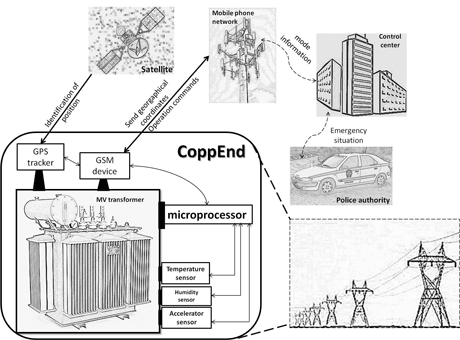by Dimitrios Serpanos, Athanasios Safacas and Dimitrios Stachoulis
Copper theft is emerging as a significant problem in the evolution and operation of critical infrastructures, such as power grids, transportation networks and water facilities. The problem has become acute due to inadequate security measures for infrastructure as well as a lack of a strict legal framework for transportation and trading of metals. CoppEnd (Copper - defEnd) is a security system designed to protect systems that use copper, focusing on power systems and their components, such as transformers.
Electricity networks constitute critical infrastructures worldwide, since they support almost all economic and social activities. Importantly, electricity networks are scaling to accommodate the increasing use of renewable energy sources and the ever-increasing power demand. Efficient interconnection of new electrical power plants with the distribution networks leads stakeholders to introduce extensions, modifications, and new routings, while installing advanced software systems in control centres. Electricity providers are incorporating new tools and processes in order to offer electricity to consumers in an optimal way, based on both demand and production levels at any given point in time. The evolution of conventional power grids to smart grids requires correct and unhindered cooperation of all installed equipment. However, the evolution is limited by external factors that can severely damage, causing them to malfunction. One of the main problems, especially in Greece, is the unreliable operation of electrical equipment owing to the theft of copper in their components.
A significant problem in the power distribution network is the destruction of Medium Voltage (MV) transformers, because of their copper content (approximately 150-200 kg in each). Their damage has disastrous effects on social and economic activities due to the loss of millions of euros during long power-outs (hours or even days at a time). These incidents have a very negative impact on operators, who need to replace the transformers and to compensate their customers. Importantly, theft incidents sometimes result in serious injuries or even loss of life.
CoppEnd is a security system for the protection of MV transformers in the network. CoppEnd enables early detection of human intervention to the system as well as tracking of the transportation of components, thus enabling timely intervention by authorities. Thus, transformers are protected, even in isolated areas.
The Greek power distribution network, operated by the Hellenic Electricity Distribution Network Operator S.A., spans more than 230,000 km, mostly in agricultural and isolated areas. The network size prohibits its continuous and uninterrupted physical monitoring, thus enabling the illegal detachment of transformers and removal of their copper. The increasing incidents, targeting more than 155,000 medium-to-low voltage units, need to be addressed not only by a stricter legal framework, but also through adoption of sophisticated protection systems [1-2]. Protection systems that use high-tech security components, such as CoppEnd, discourage individuals from attacking the network and enable their tracking when equipment is stolen. This approach differs from the conventional approaches that use mechanical means, with little success.

Figure 1: CoppEnd overview
CoppEnd continuously records the location of the equipment to which it is attached. It contains a GPS tracker equipped with a GSM transmission subsystem. The GPS tracker detects its exact geographical coordinates, while the GSM subsystem transmits the coordinates to the control centre, which positions it on the map. Thus, an administrator at a control centre is able to identify whether the initial, correct location remains stable. System control occurs through text messages to CoppEnd, which enable operation modes (on/off/standby) or change the coordinate reporting intervals (default is 30 seconds). Additionally, CoppEnd includes a microphone, controlled by the control centre, for the transmission of real-time voice data that may be useful, depending on the event or emergency. CoppEnd is attached on a transformer so that the existent electromagnetic field does cause interference and so that it cannot be extracted without causing damage to the transformer; this ensures its appropriate activation.
Any deviation from the original location constitutes an event that is reported to the control centre. Events are evaluated by the operator, since a movement may not be a malicious attack but another incident, eg an intense lightning strike. When a transformer is removed from its original location, CoppEnd alters its operation, enabling a self-powered mode via a battery system that is effectively kept charged through the power network itself; the trigger is enabled when normal power interruption is detected or when the included acceleration or pressure sensors give a command. When on battery, CoppEnd transmits at longer intervals, in order to avoid detection and lengthen its battery lifetime.
Overall, CoppEnd is a smart grid component and not just a security system. Its sophisticated architecture and operation, employing sensors and specialized middleware, discourages copper thieves and enables their tracking, while providing additional information to the operator, such as the exact location of the transformers in the area, evaluation of the quality of the transformer’s oil and emergency detection, including cases of natural disasters.
We envision extending the use of CoppEnd in the future to protect smart grid components for water supply, sewerage, and railway companies that face similar problems.
Link:
http://www.isi.gr/en/projects/coppend
References:
[1] T.M. Overman, R.W. Sackman, T.L. Davis, B.S Cohen: “High-Assurance Smart Grid: A Three-Part Model for Smart Grid Control Systems”, in proc. of the IEEE, 99(6), pp. 1046 - 1062, June 2011
[2] A.R. Metke, R.L. Ekl: “Smart Grid security technology”, Innovative Smart Grid Technologies (ISGT), 2010 , vol., no., pp.1-7, 19-21 Jan. 2010
Please contact:
Dimitrios Serpanos
ISI/RC ATHENA, Greece
E-mail:
Athanasios Safakas
Hellenic Electricity Distribution Network Operator S.A., Greece
E-mail:
{jcomments on}











